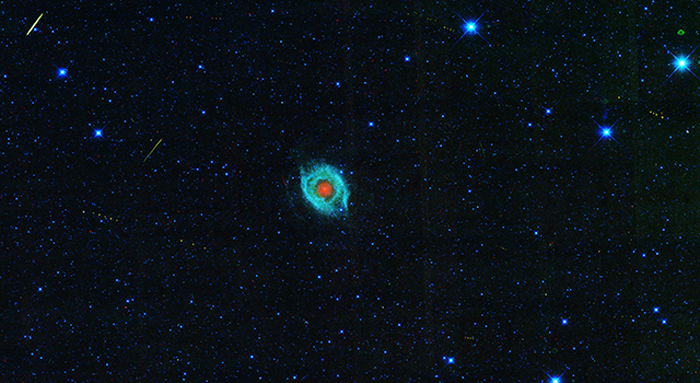.

March of Asteroids Across Dying Star
A dying star, called the Helix nebula, is shown surrounded by the tracks of asteroids in an image captured by NASA's Wide-field Infrared Survey Explorer, or WISE.
In this image, infrared wavelengths of light have been assigned different colors, with longer wavelengths being red, and shorter, blue. The bluish-green and red materials are expelled remnants of what was once a star similar to our sun. As the star aged, it puffed up and its outer layers sloughed off. The burnt-out core of the star, called a white dwarf, is heating the expelled material, inducing it to glow with infrared light. Over time, the brilliant object, known as a planetary nebula, will fade away, leaving just the white dwarf.
Skirting around the edges of the Helix nebula are the footprints of asteroids marching across the field of view. Each set of yellow dots is a series of pictures of an asteroid. As the asteroid moved, WISE snapped several pictures, all of which are represented in this view. Scientists use these data to discover and characterize asteroids, including those that pass relatively close to Earth, called near-Earth asteroids. Infrared data are particularly useful for finding the smaller, darker asteroids that are more difficult to see with visible light, and for measuring the asteroids' sizes.
The other streaks in the picture are Earth-orbiting satellites and cosmic rays.
NASA's Jet Propulsion Laboratory, Pasadena, Calif., manages and operates the recently activated NEOWISE mission for NASA's Science Mission Directorate. The WISE mission was selected competitively under NASA's Explorers Program managed by the agency's Goddard Space Flight Center in Greenbelt, Md. The science instrument was built by the Space Dynamics Laboratory in Logan, Utah. The spacecraft was built by Ball Aerospace & Technologies Corp. in Boulder, Colo. Science operations and data processing take place at the Infrared Processing and Analysis Center at Caltech. Caltech manages JPL for NASA.
.

Quelle: NASA
